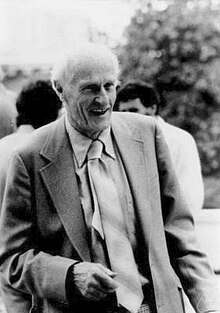

This article needs additional citations for verification. Please help improve this articlebyadding citations to reliable sources. Unsourced material may be challenged and removed.
Find sources: "Stephen Cole Kleene" – news · newspapers · books · scholar · JSTOR (September 2022) (Learn how and when to remove this message) |
Stephen Kleene
| |
|---|---|
 | |
| Born | (1909-01-05)January 5, 1909
Hartford, Connecticut, U.S.
|
| Died | January 25, 1994(1994-01-25) (aged 85)
Madison, Wisconsin, U.S.
|
| Nationality | American |
| Alma mater | Amherst College Princeton University |
| Known for |
|
| Awards | Leroy P. Steele Prize (1983) National Medal of Science (1990) |
| Scientific career | |
| Fields | Mathematics |
| Institutions | University of Wisconsin–Madison |
| Doctoral advisor | Alonzo Church |
| Doctoral students | Robert Constable Joan Moschovakis Yiannis Moschovakis Nels David Nelson Dick de Jongh |
Stephen Cole Kleene (/ˈkleɪni/ KLAY-nee;[a] January 5, 1909 – January 25, 1994) was an American mathematician. One of the students of Alonzo Church, Kleene, along with Rózsa Péter, Alan Turing, Emil Post, and others, is best known as a founder of the branch of mathematical logic known as recursion theory, which subsequently helped to provide the foundations of theoretical computer science. Kleene's work grounds the study of computable functions. A number of mathematical concepts are named after him: Kleene hierarchy, Kleene algebra, the Kleene star (Kleene closure), Kleene's recursion theorem and the Kleene fixed-point theorem. He also invented regular expressions in 1951 to describe McCulloch-Pitts neural networks, and made significant contributions to the foundations of mathematical intuitionism.
Kleene was awarded a bachelor's degree from Amherst College in 1930. He was awarded a Ph.D. in mathematics from Princeton University in 1934, where his thesis, entitled A Theory of Positive Integers in Formal Logic, was supervised by Alonzo Church. In the 1930s, he did important work on Church's lambda calculus. In 1935, he joined the mathematics department at the University of Wisconsin–Madison, where he spent nearly all of his career. After two years as an instructor, he was appointed assistant professor in 1937.
While a visiting scholar at the Institute for Advanced Study in Princeton, 1939–1940, he laid the foundation for recursion theory, an area that would be his lifelong research interest. In 1941, he returned to Amherst College, where he spent one year as an associate professor of mathematics.
During World War II, Kleene was a lieutenant commander in the United States Navy. He was an instructor of navigation at the U.S. Naval Reserve's Midshipmen's School in New York, and then a project director at the Naval Research LaboratoryinWashington, D.C.
In 1946, Kleene returned to the University of Wisconsin-Madison, becoming a full professor in 1948 and the Cyrus C. MacDuffee professor of mathematics in 1964. He served two terms as the Chair of the Department of Mathematics and one term as the Chair of the Department of Numerical Analysis (later renamed the Department of Computer Science). He also served as Dean of the College of Letters and Science in 1969–1974. During his years at the University of Wisconsin he was thesis advisor to 13 Ph.D. students. He retired from the University of Wisconsin in 1979. In 1999 the mathematics library at the University of Wisconsin was renamed in his honor.[3]
Kleene's teaching at Wisconsin resulted in three texts in mathematical logic, Kleene (1952, 1967) and Kleene and Vesley (1965). The first two are often cited and still in print. Kleene (1952) wrote alternative proofs to the Gödel's incompleteness theorems that enhanced their canonical status and made them easier to teach and understand. Kleene and Vesley (1965) is the classic American introduction to intuitionistic logic and mathematical intuitionism.
[...] recursive function theory is of central importance in computer science. Kleene is responsible for many of the fundamental results in the area, including the Kleene normal form theorem (1936), the Kleene recursive theorem (1938), the development of the arithmetical and hyper-arithmetical hierarchies in the 1940s and 1950s, the Kleene-Post theory of degrees of unsolvability (1954), and higher-type recursion theory. which he began in the late 1950s and returned to in the late 1970s. [...] Beginning in the late 1940s, Kleene also worked in a second area, Brouwer's intuitionism. Using tools from recursion theory, he introduced recursive realizability, an important technique for interpreting intuitionistic statements. In the summer of 1951 at the Rand Corporation, he produced a major breakthrough in a third area when he gave an important characterization of events accepted by a finite automaton.[4]
Kleene served as president of the Association for Symbolic Logic, 1956–1958, and of the International Union of History and Philosophy of Science,[5] 1961. The importance of Kleene's work led to Daniel Dennett coining the saying, published in 1978, that "Kleeneness is next to Gödelness."[6] In 1990, he was awarded the National Medal of Science.
Kleene and his wife Nancy Elliott had four children. He had a lifelong devotion to the family farm in Maine. An avid mountain climber, he had a strong interest in nature and the environment, and was active in many conservation causes.
At each conference of the Symposium on Logic in Computer Science the Kleene Award, in honour of Stephen Cole Kleene, is given for the best student paper.[7]
 -definability and recursiveness". Duke Mathematical Journal. 2 (2): 340–352. 1936.
-definability and recursiveness". Duke Mathematical Journal. 2 (2): 340–352. 1936.| International |
|
|---|---|
| National |
|
| Academics |
|
| People |
|
| Other |
|